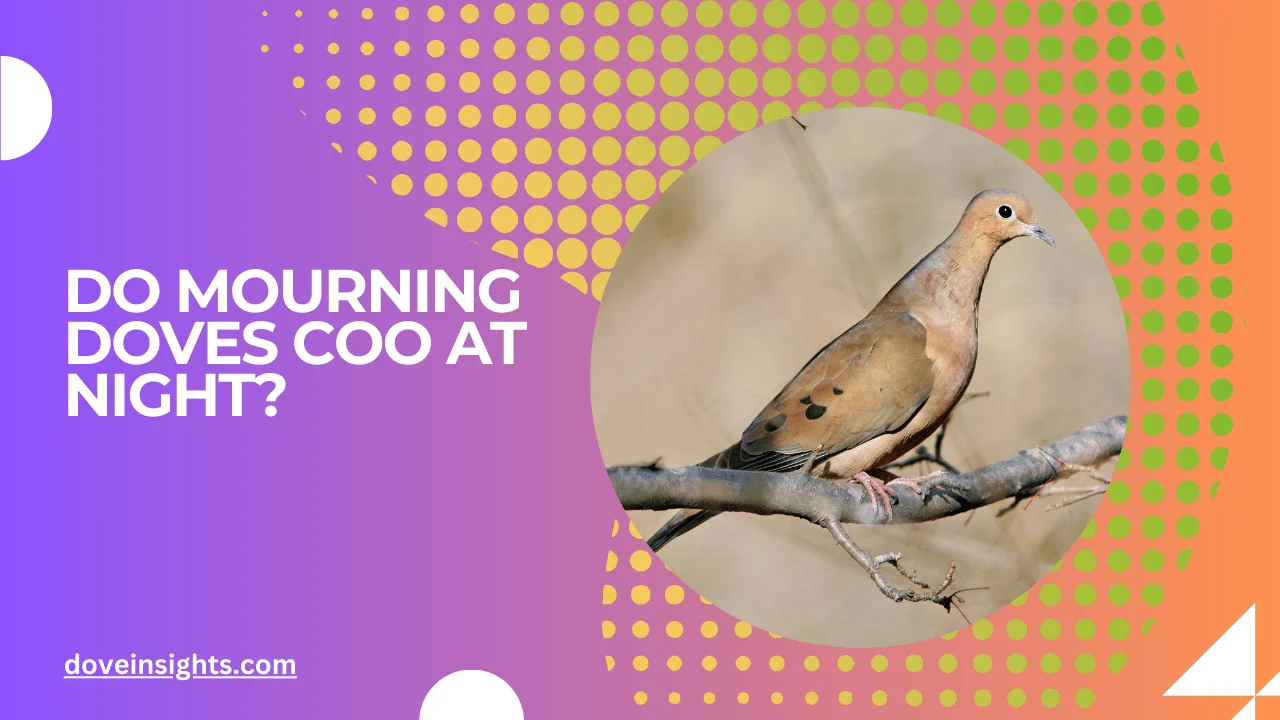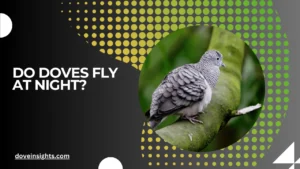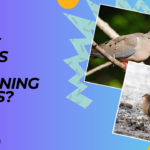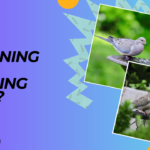The gentle and rhythmic cooing of a mourning dove is a sound often associated with peace and calm.
These birds, known for their soft vocalizations, have earned a special place in nature lovers’ hearts. But as enchanting as their daytime calls can be, many people wonder: Do mourning doves coo at night?
This question is more than just a curiosity—it opens up a window into the behavior and habits of one of the most beloved bird species in North America.
The nighttime habits of birds can be puzzling. While some birds, like owls, are known for their nocturnal calls, others, like mourning doves, are typically associated with daylight activity. However, there are exceptions, and understanding these can help us appreciate the fascinating intricacies of their lives.
Exploring whether mourning doves coo at night not only sheds light on their behavioral patterns but also deepens our connection to the natural world.
In this article, we’ll delve into the vocal habits of mourning doves, the reasons behind their cooing, and the circumstances under which they might break their daytime routine to call out at night.
If you’ve ever heard a soft coo in the stillness of the evening and wondered which bird it came from, keep reading—this exploration of mourning dove behavior is for you.
Contents
Understanding Mourning Dove Vocalizations
Mourning doves are known for their distinct cooing sound, which is both soothing and repetitive. This vocalization is primarily produced by males during mating season, as they use their calls to attract mates and establish their presence in a territory. The soft, low-pitched coo is unique to mourning doves and can often be heard in early morning or late afternoon.
- Biological Basis of Cooing: Mourning doves produce their calls using a vocal organ called the syrinx, located at the base of their trachea. This allows them to generate the gentle, rhythmic sounds that are so characteristic of the species. Unlike the harsh squawks or chirps of other birds, their coos have a melodic quality.
- Daytime vs. Nighttime Vocalizations: Mourning doves are diurnal, meaning they are most active during the day. Their cooing is generally associated with daytime activities, especially during mating seasons when they are more vocal.
Factors Influencing Mourning Dove Behavior
While mourning doves are predominantly daytime callers, there are circumstances where they might coo at night. Understanding these factors provides insight into their behavior:
- Mating Season Dynamics: During mating season, male mourning doves become more vocal to attract females. While this behavior usually occurs during the day, heightened hormonal activity might lead to occasional nighttime cooing.
- Environmental Stimuli: Mourning doves may react to environmental changes or disturbances, such as bright artificial lights or loud noises, which can trigger them to coo outside their usual hours.
- Threat Perception: If a mourning dove feels threatened or detects a predator nearby, it may vocalize at night as a warning or an alert to other birds in the vicinity.
Comparisons with Other Birds’ Nighttime Calls
To understand why mourning doves are generally not night callers, it’s helpful to compare their behavior to other bird species that are known for their nighttime vocalizations:
- Nocturnal Birds: Birds like owls and nightingales are natural night callers. They have evolved to use the quiet nighttime environment to communicate, attract mates, or establish territory.
- Crepuscular Birds: Species such as robins or whip-poor-wills are active during dawn and dusk. Mourning doves share some similarities with these birds but are not as commonly active during twilight hours.
- Rare Nighttime Cooing in Doves: While unusual, mourning doves might occasionally coo at night, especially in urban settings where artificial lights and human activity blur the boundaries between day and night.
Why Mourning Doves Rarely Coo at Night
Several biological and environmental factors explain why mourning doves are not frequent night callers:
- Diurnal Nature: Mourning doves are hardwired to follow a diurnal schedule, with most of their activities, including cooing, happening during daylight hours. Their internal biological clock governs their vocal behavior.
- Energy Conservation: Nighttime is typically reserved for rest, as vocalizing and being active during this time could deplete energy resources and expose them to nocturnal predators.
- Lack of Necessity: Unlike nocturnal birds, mourning doves do not need to vocalize at night to communicate with their mates or establish territory, as these tasks are effectively handled during the day.
Situations Where Mourning Doves Might Coo at Night
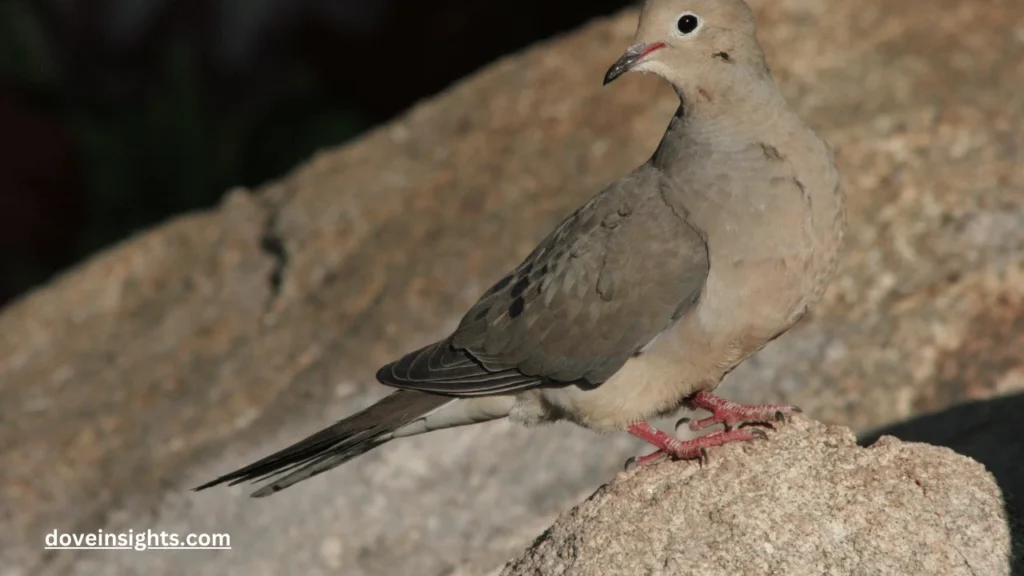
Despite their predominantly daytime habits, there are specific scenarios where mourning doves might coo at night:
- Urban Environments: In cities and suburban areas, artificial lighting and noise can disrupt the natural rhythms of mourning doves, causing them to vocalize at unusual times.
- Distress or Alarm: If mourning doves perceive a threat during the night, such as a predator nearby or a sudden loud noise, they may coo as an alarm or to warn others.
- Unusual Environmental Conditions: Events such as bright moonlight, unseasonal weather, or disturbances in their nesting area can prompt nighttime cooing.
Conclusion
In summary, while mourning doves are not typically known for their nighttime vocalizations, certain circumstances can lead to them cooing after dark. Their gentle, rhythmic coos are more often heard during the day, serving purposes such as mate attraction and territory establishment.
However, environmental disturbances, urban influences, or stressors can occasionally alter their natural patterns.
Understanding the nuances of mourning dove behavior not only deepens our appreciation for these beautiful birds but also highlights the delicate balance between nature and human activity. Whether they coo during the day or break their routine at night, mourning doves remind us of the intricate rhythms of the natural world that surround us.
FAQ’s
Do mourning doves coo at night?
Mourning doves are primarily diurnal and rarely coo at night. However, certain conditions like urban lighting or disturbances can prompt occasional nighttime vocalizations.
Why are mourning doves more active during the day?
Mourning doves are diurnal, meaning their biological clock is geared toward daytime activity, including feeding, mating, and calling.
What triggers mourning doves to coo at night?
Nighttime cooing can occur due to environmental disturbances, urban lights, or stressors like predators nearby.
Do mourning doves coo to communicate?
Yes, mourning doves use their coos to attract mates, establish territory, and communicate with other doves.
How does urbanization affect mourning doves’ behavior?
Urban environments can disrupt natural rhythms, leading to behaviors like nighttime cooing or altered activity patterns.
Are there other birds that coo at night?
Birds like owls and nightingales are more likely to vocalize at night, as they are adapted to nocturnal or crepuscular habits.

